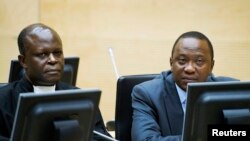NAIROBI —
Each April, Rwanda and some other African counties pay homage to victims of the 1994 genocide. Those countries include Kenya, which has also had its share of political volatility and inter-tribal fighting, especially after the 2007 presidential election.
Kenyans have since made progress building credible government institutions, and the international community has pushed Nairobi’s leaders to implement political, security and judicial reforms in order to avoid a return to violence, but some analysts say those gains are fragile.
According to political analyst Adam Oloo, a lecturer at the University of Nairobi, Kenya must learn how to let institutions work without interference.
“I think that what Kenya needs to learn, basically, is that institutions should work for the good of the country," he said. "I think Kenya did very well by coming up with a new constitution.”
In 2010, more than 60 percent of voters approved the new document, which created a Supreme Court and set new procedures for appointing top government officials, police and judges, thereby replacing the old constitution that many saw as a root cause of institutional weaknesses that enabled violence.
Late in 2012, a survey showed more than 80 percent of Kenyans had confidence in the courts. This confidence prompted the losing presidential candidate in that year's election, former prime minister Raila Odinga, to challenge the result in the Supreme Court, rather than calling for mass protests.
John Githongo, head of Inuka, or Stand Up Kenya, says some politicians are fighting recent changes. He warns that recent gains for democracy and rule of law could be erased.
“The most important instrument for peace and harmonious life in Kenya is the constitution," he said. "One of the disturbing things we are seeing is very determined effort to roll back some of the victory that has been won as a result of the new constitution.”
Githongo says the constitution is the primary instrument for holding his countrymen together in a peaceful future.
President Uhuru Kenyatta and deputy William Ruto are facing charges at the International Criminal Court they helped to orchestrate the post-election violence, but the case against Kenyatta is on the verge of collapsing.
A former anti-corruption campaigner, Githongo notes the president and Ruto formed their alliance in part to fight the ICC, and suggests things may change if the Kenyatta case is dropped.
“One is forced to ask the question, if one of the main rationale that underlay this coalition is collapsing, then obviously there shall be realignment and one hopes those realignment will happen in peaceful manner.”
But Githongo doubts that will happen. He says the nature of Kenyan politics is that change is usually accompanied by some sort of violence.
Kenyans have since made progress building credible government institutions, and the international community has pushed Nairobi’s leaders to implement political, security and judicial reforms in order to avoid a return to violence, but some analysts say those gains are fragile.
According to political analyst Adam Oloo, a lecturer at the University of Nairobi, Kenya must learn how to let institutions work without interference.
“I think that what Kenya needs to learn, basically, is that institutions should work for the good of the country," he said. "I think Kenya did very well by coming up with a new constitution.”
In 2010, more than 60 percent of voters approved the new document, which created a Supreme Court and set new procedures for appointing top government officials, police and judges, thereby replacing the old constitution that many saw as a root cause of institutional weaknesses that enabled violence.
Late in 2012, a survey showed more than 80 percent of Kenyans had confidence in the courts. This confidence prompted the losing presidential candidate in that year's election, former prime minister Raila Odinga, to challenge the result in the Supreme Court, rather than calling for mass protests.
John Githongo, head of Inuka, or Stand Up Kenya, says some politicians are fighting recent changes. He warns that recent gains for democracy and rule of law could be erased.
“The most important instrument for peace and harmonious life in Kenya is the constitution," he said. "One of the disturbing things we are seeing is very determined effort to roll back some of the victory that has been won as a result of the new constitution.”
Githongo says the constitution is the primary instrument for holding his countrymen together in a peaceful future.
President Uhuru Kenyatta and deputy William Ruto are facing charges at the International Criminal Court they helped to orchestrate the post-election violence, but the case against Kenyatta is on the verge of collapsing.
A former anti-corruption campaigner, Githongo notes the president and Ruto formed their alliance in part to fight the ICC, and suggests things may change if the Kenyatta case is dropped.
“One is forced to ask the question, if one of the main rationale that underlay this coalition is collapsing, then obviously there shall be realignment and one hopes those realignment will happen in peaceful manner.”
But Githongo doubts that will happen. He says the nature of Kenyan politics is that change is usually accompanied by some sort of violence.




